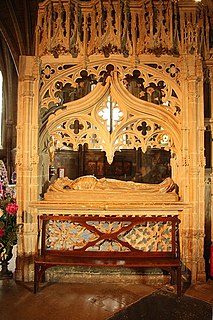Related Research Articles

Alien priories were religious establishments in England, such as a monastery or convent, which were under the control of another religious house outside England. Usually the mother-house was in France.
William of Ramsey was a 13th-century English Benedictine monk of Croyland Abbey, born at Ramsey, Huntingdonshire.

John Wakeman was an English Benedictine, the last Abbot of Tewkesbury and first Bishop of Gloucester, both posts in the English county of Gloucestershire. In the earlier part of his life he went by the name John Wiche.
Robert Parfew was an English Benedictine abbot, at the time of the dissolution of the monasteries, and bishop successively of St Asaph and Hereford.
Adam of Damerham, was a Benedictine monk of Glastonbury Abbey, who wrote a history of the abbey, and was active in the ecclesiastical politics of his time.
Adam de Senlis, also called Adam of Evesham, was a Benedictine monk who became abbot of Evesham Abbey.
Ælric, perhaps a misspelling of Ælfric or Æthelric, archbishop-elect of Canterbury, was a kinsman of Godwin, Earl of Wessex.
Arras College was a Catholic foundation in Paris, a house of higher studies associated with the University of Paris, set up in 1611. It was intended for English priests, and had a function as a House of Writers, or apologetical college. This aspect of the college was prompted by the 1609 foundation of Chelsea College in London, designed for the production of polemical Protestant literature.
Saint Gudwal, was a Welsh bishop and confessor.
Warner or Garnier, was an English writer of homilies, and a monk of Westminster.
Edmund de Bromfield was an English Benedictine who became bishop of Llandaff.
Richard Bromsgrove, was a monk of the Benedictine abbey of Evesham.
John Griffith or Griffin was a Welsh præmonstratensian and a monk of the order of Cistercians in Halesowen Abbey, Worcestershire.
Folcard or Foulcard was a Flemish hagiographer.
Forannan, fl. c. 969, was Bishop of Donoughmore.
Clement Reyner D.D. (1589–1651) was an English Benedictine monk, who became abbot of Lamspringe in Germany.
Richard was an English Benedictine and Cistercian, the first abbot of Fountains.
Benedict of Norwich was an Augustinian monk who flourished in the reign of Edward III. According to John Bale he was distinguished for his linguistic, his scientific, and his theological skill. However, Bale finds great fault with the tendency of Benedict's teaching, accusing him of a leaning towards Novatianism, Arianism, and other heresies, and also of trusting too much to Gentile authority, 'when he should have known that the divine wisdom has no need of human inventions.'
Thomas Sprott or Spott was an English Benedictine chronicler, a monk of St Augustine's Abbey, Canterbury.
Baldwin was a French monk and royal physician. He became a monk in France before coming to England to serve as King Edward the Confessor's doctor. He served as a prior before becoming abbot of Bury St Edmunds in 1065. As abbot he promoted the cult of Edmund the Martyr and secured the abbey's independence from the bishops of Thetford. He continued to serve as royal physician to two more kings of England and also rebuilt parts of the abbey before dying around 1097.
References
- . Dictionary of National Biography . London: Smith, Elder & Co. 1885–1900.
- Attribution
![]() This article incorporates text from a publication now in the public domain : "Thorne, William (fl.1397)". Dictionary of National Biography . London: Smith, Elder & Co. 1885–1900.
This article incorporates text from a publication now in the public domain : "Thorne, William (fl.1397)". Dictionary of National Biography . London: Smith, Elder & Co. 1885–1900.